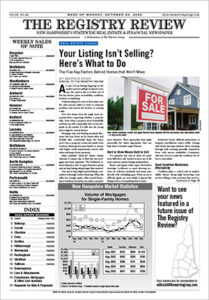
A recent analysis by real estate data firm Attom found New Hampshire had one of the lowest instances of foreclosure in the nation. iStock illustration
New Hampshire’s super-low foreclosure rate is bucking the national trend – so far.
According to Attom, a real estate analytics firm, U.S. foreclosure activity in August was up by 18 percent compared to the year prior, with 35,697 properties hit by default notices, scheduled auctions and bank repossessions.
Though the numbers are still below pre-pandemic levels, August was the third straight month of double-digit increases in foreclosure activity across the country, according to data.
Nevada was the hardest-hit state – with foreclosure activity hitting one out of every 2,069 housing units in August, according to data. South Carolina (one in 2,152 housing units) and Florida (one in 2,512 housing units) had the second and third highest foreclosure activity in August, respectively.
And New Hampshire?
The state’s foreclosure activity was actually down by 46 percent in August compared to the year prior, from 133 filings in 2024 to 71 filings in 2025.
It ranked 43rd in foreclosure activity in the U.S. – with one filing for every 9,074 housing units in the state, according to Attom.
An analysis of data by The Warren Group, publisher of The Registry Review, shows a similar year-to-date decline in foreclosure activity in New Hampshire.
Foreclosure auction notices fell by 16.18 percent through the first eight months of the year, compared to the same period in 2024; foreclosure deeds recorded at the state’s registries of deeds tumbled by 13.5 percent year-to-date through August, according to data.
So why is New Hampshire such an outlier?
Experts say a variety of factors can influence foreclosure activity from state to state.
In the case of New Hampshire, the local economy is exceptionally strong, with a 3 percent jobless rate compared to the nation’s 4.3 percent unemployment rate.
New Hampshire also has a high median household income of roughly $100,000, more than 20 percent higher than the U.S. median household income, according to U.S. Census data.
But New Hampshire’s biggest housing-market negative may also be helping keep the state’s foreclosure activity low: the notoriously low supply of homes for sale.
Price Escalation Helps Sellers
Elissa Margolin, director of the Initiative for Housing Policy and Practice at Saint Anselm College, said foreclosures usually occur when homeowners find themselves in a financial crisis, whether it’s caused by someone losing a job or enduring a costly health-care emergency.
But in a housing market in which demand is high and supply is low, people in financial trouble can always quickly sell their homes – and maybe even make a tidy equity profit after bills are paid due to escalating home values.
“There’s a line of people waiting to buy a home these days in New Hampshire,” she said.
“So, when you find yourself in a tough [financial] situation, you can literally flip your home in weeks. The housing shortage is obviously not good for the state. But in a way, the shortage does provide a favorable environment for people to get out of financial trouble quickly.”
Other housing experts agreed that high real estate prices – caused by the acute supply-and-demand imbalance in New Hampshire – can both be both a curse and a blessing for some people facing financial difficulties.
High prices are a curse if homeowners can’t keep up with mortgage payments, for whatever reasons, but an ironic blessing if they need to sell their homes quickly.
“People can get ahead if they can sell their homes fast – and maybe even pocket (an extra) $50,000 or so,” says Rob Dapice, executive director and CEO of the New Hampshire Housing Finance Authority, known commonly as New Hampshire Housing.
But Dapice said that New Hampshire’s low foreclosure activity is ultimately a sign of an overall healthy and strong economy.
“The [low foreclosure] numbers are encouraging, but I would caution against complacency,” he said.
He noted that, among other things, a Federal Housing Authority mortgage insurance program is due to expire soon – and that could spell trouble for some financially struggling homebuyers in New Hampshire.
Bankruptcies Up 23 Percent Last Year
Meanwhile, others say they’re carefully monitoring bankruptcy filings as a potential harbinger of financial struggles ahead for homeowners – and those numbers aren’t exactly encouraging.
According to court data, bankruptcy filings of all types across the U.S. were up 11.5 percent through the first half of 2025.
New Hampshire’s bankruptcy filings were up an annualized 4.4 percent in the first half of 2025 – after seeing a 22.8 percent rise through all of 2024 and an 8.6 percent rise in 2023, according to court data.
Bankruptcy filings are still low by historic standards, but they’re certainly not headed in the right direction.
Len Deming, a bankruptcy attorney at Deming Law Offices in Nashua, said he’s noticed increased activity on the bankruptcy front in the state – and thus on the foreclosure front as well.
“It’s not a huge uptick, but it’s been going up,” he said of bankruptcy-related activity.
Another economic statistic that Deming said he’s monitoring closely as a potential harbinger of things to come: U.S. consumer credit card debt, now at a record high of $1.2 trillion, amid rising delinquency rates.
Then there’s student loan debts – and the Trump administration’s plans to get tougher with borrowers by limiting their ability to declare bankruptcy, he said.
But as long as New Hampshire’s economy remains strong, most experts expect foreclosure activity to remain relatively tame.
Mike Skelton, president and CEO of the Business & Industry Association of New Hampshire, said the state’s housing market and strong economy are both playing a key role in keeping foreclosure activity low.
But he warned things could easily change, noting all the economic uncertainties facing the state and country, from inflation to tariffs to a softening labor market.
“Right now, our economy is performing relatively well,” he said. “Let’s hope it lasts.”

